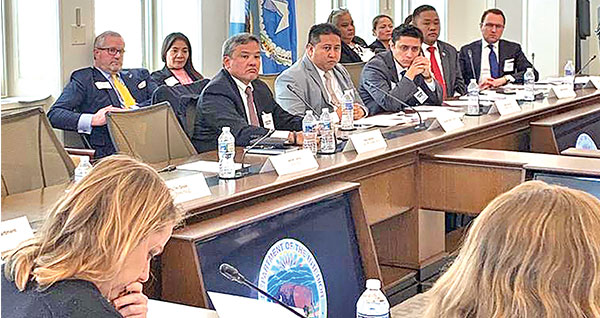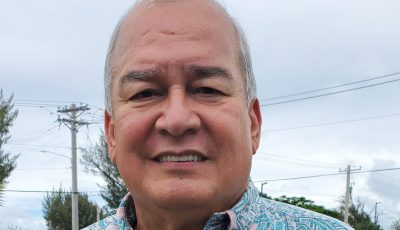902 talks hope to address NMI issues

Gov. Ralph DLG Torres, second left, leads the CNMI 902 Consultation panel at the start of their meeting with representatives of the administration of President Donald J. Trump in Washington. D.C. Also in attendance are, from left, Northern Marianas Business Alliance Council chair Alex Sablan, Torres’ senior advisor Matt Deleon Guerrero, and his chief of staff Angel Demapan. (Contributed Photo)
CNMI officials and the federal panel appointed by President Donald J. Trump opened the series of Section 902 talks on Tuesday in Washington, D.C., starting the dialogue in finding solutions to some of the problems and challenges that the Commonwealth is currently facing.
The administration, in a statement, said the CNMI panel, led by Gov. Ralph DLG Torres, and their federal counterparts had a productive first day of consultations. “[It] opens further discussions toward a resolution that addresses the CNMI’s unique needs and challenges.”
“Gov. Torres will continue to work with our federal partners toward policies that will protect the CNMI’s economic viability and benefit every single person who calls these islands home.”
Labor and immigration are currently the hot issues in the Commonwealth right now after U.S. Citizenship and Immigration Services discontinued the CNMI categorical parole in December and the U.S. Department of Homeland Security’s decision that the Philippines is no longer eligible for the H-2B worker visa program.
Those who are affected by the categorical parole are spouses and immediate relatives of citizens of Freely Associated States and spouses or IRs of U.S. citizens; parents of U.S. citizen children who are either under or over 21 years old; CNMI permanent residents, and stateless individuals.
The CNMI has also been reliant on foreign guest workers with the Philippines being one of the top sources, especially in the construction trades. Filipinos are the largest group of foreign workers in the CNMI that also have laborers from Bangladesh, China, Korea, Japan, Thailand, and Nepal. In recent years, U.S. and local hire have also increased.
The Philippines’ one-year ban from using the H-2B visa had already caused problems to the Commonwealth with construction of several hotel projects slowing down. Imperial Pacific International (CNMI) LLC is among the investors that encountered problems with the H-2B visa and was forced to send hundreds of Filipino skilled workers home in the last three months due to the DHS decision.
The Covenant established the CNMI in political union with the U.S. and it governs the relationship between both governments. Section 902 of the Covenant is the chance for representatives from both governments to meet and discuss issues that affect the relationship between the CNMI and the U.S.
The series of meetings became known as the 902 Consultations where after the talks the entire panel would submit a report and recommendation based on their discussions.
Torres sent a letter to Trump in October last year to request his approval to begin the Section 902 Consultations, citing the continuation on the Chinese discretionary parole authority. “The matter we need to consider is the CNMI’s continued access to the China market, in a manner that is agreeable to the federal government and the survival of our economy.”
“This issue is critically important to both our governments as it will affect the United States’ relationship with CNMI and is in all honestly directly linked to the economic survival of the Northern Mariana Islands.”
Torres added that China represents 38.68 percent of the CNMI’s tourism market and has an estimated 42.4 percent share in the economy of the Commonwealth. “Their presence is a major driver of our economy and an incredible public benefit to our community.”
“The CNMI’s recent economic growth, bolstered by Chinese tourism, has provided U.S. citizen jobs and greater government services to our people while reducing our impact on the [U.S.] federal budget.”
He added that his administration was informed that DHS is reviewing the discretionary parole program for Chinese tourists. “While I welcome review and respect the process and authority of DHS on this matter, the potential collapse of the CNMI economy as a result of the revocation of DHS’s discretionary parole authority to allow Chinese tourists to visit the CNMI is of paramount concern to our relationship under our Covenant agreement.”
“I request these consultations to bring forward information necessary for our young administration to weigh the potential total costs of revocation to our economy and our relationship. Moreover, I hope to work together through this process to craft a new policy as it relates to the CNMI’s access to tourism markets that will be of benefit to our long-term relationship.”
Torres’ chief of staff Angel A. Demapan, governor special advisor Matt Deleon Guerrero, policy analyst and Governor’s Office legal counsel Janina Maratita, CNMI Department of Labor Secretary Vicky Benavente, and Governor’s Office general counsel Gil Birnbrich joined the CNMI chief executive as members of the government panel.
Northern Marianas Business Alliance Corp. chair Alex Sablan and board member Viola Alepuyo, Commonwealth Ports Authority chair Kimberly King-Hinds, lawyer Igor Timofeyev, and CNMI Washington Office director Jason Osborne were also part of the delegation from the Commonwealth.
Trump appointed Department of the Interior Assistant Secretary for Insular and International Affairs Doug Domenech to lead the federal panel that also included representatives from DHS, National Security Council, White House officials—Intergovernmental Affairs Office and Domestic Policy Council, Office of Management and Budget, and the Customs and Border Protection.





















